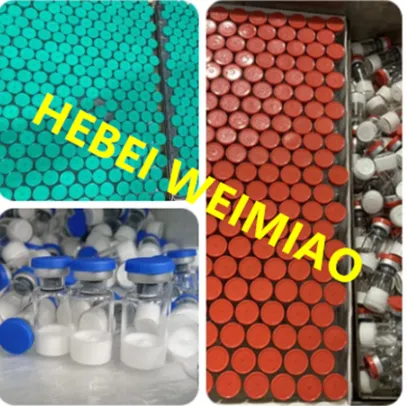
- +86-13363869198
- weimiaohb@126.com

Eka . 24, 2025 11:36 Itzuli zerrendara
Pharmaceutical Intermediates Play a Critical Role in the Drug Manufacturing Process
Pharmaceutical Intermediates play a crucial role in the drug manufacturing process. These organic compounds are important components in the synthesis process of active pharmaceutical ingredients (APIs), connecting the starting materials and the final drug product. They play a crucial role in the chemical synthesis steps, affecting the efficiency, purity, and final cost-effectiveness of drugs.

Pharmaceutical Intermediates allow for a staged drug synthesis process
Synthesizing a complex API often requires a series of intricate chemical reactions. By using API intermediates, complex synthesis can be broken down into smaller, more controllable steps. This gradual synthesis method not only increases yield, but also minimizes the production of by-products to ensure the purity of the final product.
The selection of Pharmaceutical Intermediates directly affects the overall efficiency of drug production
By carefully designing the structure and reaction route of pharma intermediates, reaction conditions can be optimized to improve reaction rate and yield. The use of appropriate Pharmaceutical Intermediates can also reduce the amount of solvents and reagents required, thereby reducing environmental impact and lowering waste disposal costs.
The purity of Pharmaceutical Intermediates is a key determinant of drug quality
High purity active pharmaceutical intermediates can minimize impurities in the final API, ensuring the safety and efficacy of drugs. Pharmaceutical manufacturers must strictly control the production process of Pharmaceutical Intermediates to ensure compliance with strict quality standards. Through efficient analytical methods such as high-performance liquid chromatography (HPLC) and gas chromatography-mass spectrometry (GCMS), the purity of Pharmaceutical Intermediates can be monitored to ensure the quality of the final product.
Pharmaceutical Intermediates Affects the Cost effectiveness of Drugs
By optimizing the synthesis route of APIs and intermediates, production costs can be reduced and the overall competitiveness of drugs can be improved. In addition, choosing pharmaceutical intermediates that are easy to obtain and produce can also help reduce raw material costs and further lower production costs.
In summary, Pharmaceutical Intermediates play an indispensable role in the drug manufacturing process. They not only affect the synthesis efficiency and purity of drugs, but also directly relate to the safety and cost-effectiveness of drugs. Pharmaceutical companies must attach great importance to the research and production of Pharmaceutical Intermediates, strictly control the quality of Pharmaceutical Intermediates, and ensure the quality and safety of the final drug products.
Pharmaceutical Intermediates FAQs
What are Pharmaceutical Intermediates?
Pharmaceutical Intermediates are key chemical substances in the synthesis process of active pharmaceutical ingredients, typically requiring multiple reactions to form the final drug composition. For example, 6APA in penicillin production is a type of Pharmaceutical Intermediates.
Function: Reduce the complexity of raw material drug synthesis, improve production efficiency and purity.
What is the difference between Pharmaceutical Intermediates and Active Pharmaceutical Ingredients (APIs)?
Pharmaceutical Intermediates: Compounds that do not yet possess complete pharmacological activity and require further processing.
API: The active ingredient in the final drug that can be directly used in the production of formulations.
For example, the pharmaceutical intermediates of the anti diabetes drug metformin are dimethylamine hydrochloride, while the API is metformin itself.
How are Pharmaceutical Intermediates classified?
It can be divided into:
Primary Pharmaceutical Intermediates: have a simple structure and are far from APIs (such as benzene ring derivatives).
Advanced Pharmaceutical Intermediates: Similar to API structure, requiring only 12 steps of reaction (such as chiral Pharmaceutical Intermediates).
Industry trend: The demand for high value-added advanced pharmaceutical intermediates is growing faster.
What are the core challenges in the Pharmaceutical Intermediates industry?
Technical barriers: Must comply with strict quality standards (such as ICH guidelines).
Environmental pressure: The synthesis process may involve hazardous chemicals such as cyanide.
Supply chain dependence: China is the world's largest producer of Pharmaceutical Intermediates (accounting for 60% of the market share), but it needs to cope with international competition.
What is the future development direction of Pharmaceutical Intermediates?
Green chemistry: Developing low pollution synthesis processes (such as enzyme catalysis).
CDMO model: customized production (such as companies like WuXi AppTec and Kailaiying).
Innovative Pharmaceutical Intermediates: With the rise of biopharmaceuticals and ADC drugs, there is an increasing demand for new types of Pharmaceutical Intermediates.
-
CAS: 79099-07-3 Factories | GMP Stock, OEM, Fast Delivery
BerriakNov.17,2025
-
CAS: 79099-07-3 Factories | GMP Quality, Factory Prices
BerriakNov.17,2025
-
GS-441524 for White Liquid Type Factories | GMP OEM Bulk
BerriakNov.17,2025
-
CAS: 79099-07-3 Factories | GMP Bulk Supply, Fast Shipping
BerriakNov.17,2025
-
gs-441524 for white liquid type factories | GMP & fast ship
BerriakNov.17,2025
-
High-Purity cas 1451-83-8 factory | GMP Bulk, Fast Delivery
BerriakNov.17,2025